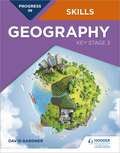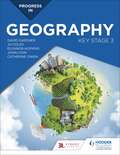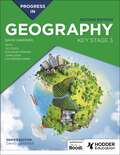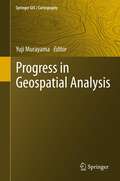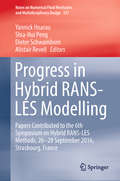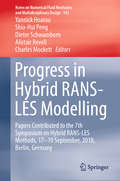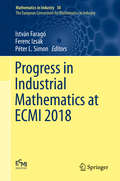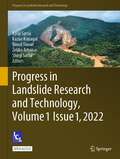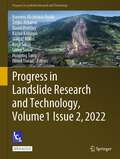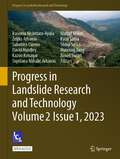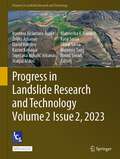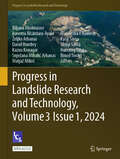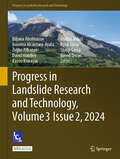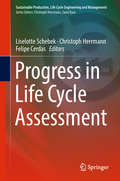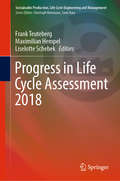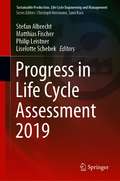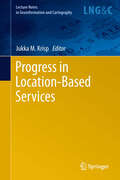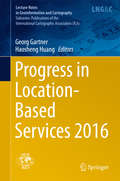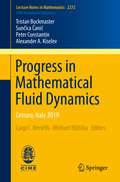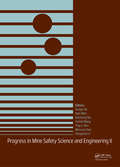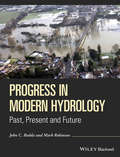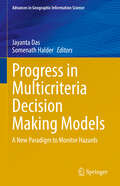- Table View
- List View
Progress in Geography Skills: Key Stage 3
by David GardnerThis book is designed to help students build up and apply geographical skills throughout KS3. A wide range of skills are introduced in Unit 1, and then revisited and progressed in different contexts in Units 2-15 as part of a learning journey to becoming a geographer. These skills are progressed as an integral component of an enquiry process. The book provides a firm foundation for the geographical skills required at GCSE level and beyond. A wide range of geographical data is provided including satellite images and a large number of OS maps at a variety of scales, often linked to other data, such as ground and aerial photos. Progress in Geography Skills: Key Stage 3 can be used independently or alongside the Progress in Geography: Key Stage 3 Student book.Each page has a specific learning objective and skills focus, such as:- Conducting geographical enquiries; considering different points of view and making decisions - Drawing field sketches, linked to OS maps and locating places using lines of latitude and longitude on an atlas or grid references on OS maps- Understanding and drawing a wide variety of graphs- Analysis and presentation of statistical data- Comparing ground level photographs with Ordnance Survey maps and being able to identify coastal, glacial and river landforms on OS maps- Using newspapers to investigate issues, and detect bias- Using websites, including online GiS, as part of enquiries and investigating data
Progress in Geography Skills: Key Stage 3
by David GardnerHighly Commended in the GA Publishers' Awards 2021:"This comprehensive resource has been designed to work alongside Progress in Geography and uses the same format and recognisable layout. It can also be used as a standalone text and is packed full of resources, well-framed activities, support and practice to help students to develop key geographical skills and think critically about what they're learning. The judges also felt it could be a useful reference for non-specialists and trainee teachers." This book is designed to help students build up and apply geographical skills throughout KS3. A wide range of skills are introduced in Unit 1, and then revisited and progressed in different contexts in Units 2-15 as part of a learning journey to becoming a geographer. These skills are progressed as an integral component of an enquiry process. The book provides a firm foundation for the geographical skills required at GCSE level and beyond. A wide range of geographical data is provided including satellite images and a large number of OS maps at a variety of scales, often linked to other data, such as ground and aerial photos. Progress in Geography Skills: Key Stage 3 can be used independently or alongside the Progress in Geography: Key Stage 3 Student book.Each page has a specific learning objective and skills focus, such as:- Conducting geographical enquiries; considering different points of view and making decisions - Drawing field sketches, linked to OS maps and locating places using lines of latitude and longitude on an atlas or grid references on OS maps- Understanding and drawing a wide variety of graphs- Analysis and presentation of statistical data- Comparing ground level photographs with Ordnance Survey maps and being able to identify coastal, glacial and river landforms on OS maps- Using newspapers to investigate issues, and detect bias- Using websites, including online GiS, as part of enquiries and investigating data
Progress in Geography: Key Stage 3
by David Gardner Catherine Owen Eleanor HopkinsMotivate pupils to develop their geographical skills, knowledge and understanding as they become engaged and accomplished geographers, ready for the demands of GCSE.Specifically designed to provide a solid foundation for the 2016 GCSE specifications, this Student Book takes an enquiry-based approach to learning within each unit and lesson.- Easily and cost-effectively implement a new KS3 scheme of work: this coherent single-book course covers the latest National Curriculum content, providing 150 ready-made lessons that can be used flexibly for a two or three-year KS3- Build and improve the geographical knowledge and skills that pupils need: every double-page spread represents a lesson, with rich geographical data and place contexts for pupils to interpret, analyse andevaluate- Lay firm foundations for GCSE: key vocabulary, command words and concepts are introduced gradually, preparing pupils for the content and question types they will encounter at GCSE, with a particular focus on analysis and evaluation questions- Effectively assess, measure and demonstrate progress: formative assessments throughout each lesson and summative end-of-unit reviews include questions that show whether pupils are 'working towards', 'meeting' or 'exceeding' expectations- Encourage pupils to check and drive their own progress: learning objectives and end-of-unit learning outcomes help pupils reflect on their learning and make connections between key concepts and skills throughout the course
Progress in Geography: Key Stage 3, Second Edition
by David Gardner Catherine Owen Jo Coles John Lyon Eleanor BarkerPut progression at the heart of your curriculum with this hugely popular KS3 course from David Gardner, a leading authority in the Geography community.Fully reviewed and updated - with three new units - this forward-thinking course will fascinate young geographers, incorporating many diverse voices and exploring 'big ideas' such as place, the Earth's systems, the impact of colonialism and the complexities of development.> Choose the most cost-effective course. With 180 ready-made lessons in a single book, Progress in Geography provides a full three-year KS3. The free accompanying Progression Framework maps progress from Year 7 to Year 9, across the National Curriculum and towards the GCSE Assessment Objectives.> Ensure progress in geographical skills, knowledge and understanding. Every lesson and every unit builds upon prior learning and links to future learning, fully embedding geographical enquiry. Each double-page spread represents one lesson, with rich geographical resources, up-to-date data and case studies for pupils to interpret, analyse and evaluate.> Align with Ofsted's expectations. Curriculum expert David Gardner has fully integrated disciplinary, substantive and procedural knowledge, as recommended in Ofsted's 2023 Geography Subject Report and the GA Curriculum Framework.> Assess and demonstrate pupil progress. Ideal for formative assessment, lesson activities create a stepped approach to enquiry learning, guiding pupils through the geographical data as they answer each lesson's enquiry question. End-of-unit review lessons create a reflection point, facilitating medium-term summative assessment and giving a broader view of progress.> Lay firm foundations for GCSE. Key vocabulary, command words and concepts are introduced gradually, preparing pupils for the content and question types they will encounter at GCSE, with a particular focus on analysis and evaluation, plus newly added decision-making activities.
Progress in Geography: Key Stage 3, Second Edition
by David Gardner Catherine Owen Jo Coles John Lyon Eleanor BarkerPut progression at the heart of your curriculum with this hugely popular KS3 course from David Gardner, a leading authority in the Geography community.Fully reviewed and updated - with three new units - this forward-thinking course will fascinate young geographers, incorporating many diverse voices and exploring 'big ideas' such as place, the Earth's systems, the impact of colonialism and the complexities of development.> Choose the most cost-effective course. With 180 ready-made lessons in a single book, Progress in Geography provides a full three-year KS3. The free accompanying Progression Framework maps progress from Year 7 to Year 9, across the National Curriculum and towards the GCSE Assessment Objectives.> Ensure progress in geographical skills, knowledge and understanding. Every lesson and every unit builds upon prior learning and links to future learning, fully embedding geographical enquiry. Each double-page spread represents one lesson, with rich geographical resources, up-to-date data and case studies for pupils to interpret, analyse and evaluate.> Align with Ofsted's expectations. Curriculum expert David Gardner has fully integrated disciplinary, substantive and procedural knowledge, as recommended in Ofsted's 2023 Geography Subject Report and the GA Curriculum Framework.> Assess and demonstrate pupil progress. Ideal for formative assessment, lesson activities create a stepped approach to enquiry learning, guiding pupils through the geographical data as they answer each lesson's enquiry question. End-of-unit review lessons create a reflection point, facilitating medium-term summative assessment and giving a broader view of progress.> Lay firm foundations for GCSE. Key vocabulary, command words and concepts are introduced gradually, preparing pupils for the content and question types they will encounter at GCSE, with a particular focus on analysis and evaluation, plus newly added decision-making activities.
Progress in Geography: Motivate, engage and prepare pupils
by David Gardner Catherine Owen Jo Coles John Lyon Eleanor BarkerMotivate pupils to develop their geographical skills, knowledge and understanding as they become engaged and accomplished geographers, ready for the demands of GCSE.Specifically designed to provide a solid foundation for the 2016 GCSE specifications, this Student Book takes an enquiry-based approach to learning within each unit and lesson.- Easily and cost-effectively implement a new KS3 scheme of work: this coherent single-book course covers the latest National Curriculum content, providing 150 ready-made lessons that can be used flexibly for a two or three-year KS3- Build and improve the geographical knowledge and skills that pupils need: every double-page spread represents a lesson, with rich geographical data and place contexts for pupils to interpret, analyse andevaluate- Lay firm foundations for GCSE: key vocabulary, command words and concepts are introduced gradually, preparing pupils for the content and question types they will encounter at GCSE, with a particular focus on analysis and evaluation questions- Effectively assess, measure and demonstrate progress: formative assessments throughout each lesson and summative end-of-unit reviews include questions that show whether pupils are 'working towards', 'meeting' or 'exceeding' expectations- Encourage pupils to check and drive their own progress: learning objectives and end-of-unit learning outcomes help pupils reflect on their learning and make connections between key concepts and skills throughout the course
Progress in Geospatial Analysis
by Yuji MurayamaThis book examines current trends and developments in the methods and applications of geospatial analysis and highlights future development prospects. It provides a comprehensive discussion of remote sensing- and geographical information system (GIS)-based data processing techniques, current practices, theories, models, and applications of geospatial analysis. Data acquisition and processing techniques such as remote sensing image selections, classifications, accuracy assessments, models of GIS data, and spatial modeling processes are the focus of the first part of the book. In the second part, theories and methods related to fuzzy sets, spatial weights and prominence, geographically weighted regression, weight of evidence, Markov-cellular automata, artificial neural network, agent-based simulation, multi-criteria evaluation, analytic hierarchy process, and a GIS network model are included. Part three presents selected best practices in geospatial analysis. The chapters, all by expert authors, are arranged so that readers who are new to the field will gain an overview and important insights. Those readers who are already practitioners will gain from the advanced and updated materials and state-of-the-art developments in geospatial analysis.
Progress in Hybrid RANS-LES Modelling: Papers Contributed To The 5th Symposium On Hybrid Rans-les Methods, 19-21 March 2014, College Station, A&m University, Texas, Usa (Notes On Numerical Fluid Mechanics And Multidisciplinary Design Ser. #130)
by Shia-Hui Peng Dieter Schwamborn Yannick Hoarau Alistair RevellThis book reports on the latest developments in computational fluid dynamics and turbulence modeling, with a special emphasis on hybrid RANS-LES methods and their industrial applications. It gathers the proceedings of the Sixth Symposium on Hybrid RANS-LES Methods, held on September 26-28 in Strasbourg, France. The different chapters covers a wealth of topics such as flow control, aero-acoustics, aero-elasticity and CFD-based multidisciplinary optimization. Further topics include wall-modelled Large Eddy Simulation (WMLES), embedded LES, Lattice-Bolzman methods, turbulence-resolving applications and comparisons between LES, hybrid RANS-LES and URANS methods. The book addresses academic researchers, graduate students, industrial engineers, as well as industrial R&D managers and consultants dealing with turbulence modelling, simulation and measurement, and with multidisciplinary applications of computational fluid dynamics.
Progress in Hybrid RANS-LES Modelling: Papers Contributed to the 7th Symposium on Hybrid RANS-LES Methods, 17–19 September, 2018, Berlin, Germany (Notes on Numerical Fluid Mechanics and Multidisciplinary Design #143)
by Shia-Hui Peng Dieter Schwamborn Charles Mockett Yannick Hoarau Alistair RevellThis book gathers the proceedings of the Seventh Symposium on Hybrid RANS-LES Methods, which was held on September 17-19 in Berlin, Germany. The different chapters, written by leading experts, reports on the most recent developments in flow physics modelling, and gives a special emphasis to industrially relevant applications of hybrid RANS-LES methods and other turbulence-resolving modelling approaches. The book addresses academic researchers, graduate students, industrial engineers, as well as industrial R&D managers and consultants dealing with turbulence modelling, simulation and measurement, and with multidisciplinary applications of computational fluid dynamics (CFD), such as flow control, aero-acoustics, aero-elasticity and CFD-based multidisciplinary optimization. It discusses in particular advanced hybrid RANS-LES methods. Further topics include wall-modelled Large Eddy Simulation (WMLES) methods, embedded LES, Lattice-Bolzman methods and turbulence-resolving applications and a comparison of the LES methods with both hybrid RANS-LES and URANS methods. Overall, the book provides readers with a snapshot on the state-of-the-art in CFD and turbulence modelling, with a special focus to hybrid RANS-LES methods and their industrial applications.
Progress in Industrial Mathematics at ECMI 2018 (Mathematics in Industry #30)
by István Faragó Péter L. Simon Ferenc IzsákThis book explores mathematics in a wide variety of applications, ranging from problems in electronics, energy and the environment, to mechanics and mechatronics. The book gathers 81 contributions submitted to the 20th European Conference on Mathematics for Industry, ECMI 2018, which was held in Budapest, Hungary in June 2018. The application areas include: Applied Physics, Biology and Medicine, Cybersecurity, Data Science, Economics, Finance and Insurance, Energy, Production Systems, Social Challenges, and Vehicles and Transportation. In turn, the mathematical technologies discussed include: Combinatorial Optimization, Cooperative Games, Delay Differential Equations, Finite Elements, Hamilton-Jacobi Equations, Impulsive Control, Information Theory and Statistics, Inverse Problems, Machine Learning, Point Processes, Reaction-Diffusion Equations, Risk Processes, Scheduling Theory, Semidefinite Programming, Stochastic Approximation, Spatial Processes, System Identification, and Wavelets. The goal of the European Consortium for Mathematics in Industry (ECMI) conference series is to promote interaction between academia and industry, leading to innovations in both fields. These events have attracted leading experts from business, science and academia, and have promoted the application of novel mathematical technologies to industry. They have also encouraged industrial sectors to share challenging problems where mathematicians can provide fresh insights and perspectives. Lastly, the ECMI conferences are one of the main forums in which significant advances in industrial mathematics are presented, bringing together prominent figures from business, science and academia to promote the use of innovative mathematics in industry.
Progress in Landslide Research and Technology, Volume 1 Issue 1, 2022 (Progress in Landslide Research and Technology)
by Kyoji Sassa Željko Arbanas Binod Tiwari Kazuo Konagai Shinji SassaThis open access book provides an overview of the progress in landslide research and technology and is part of a book series of the International Consortium on Landslides (ICL). The book provides a common platform for the publication of recent progress in landslide research and technology for practical applications and the benefit for the society contributing to the Kyoto Landslide Commitment 2020, which is expected to continue up to 2030 and even beyond to globally promote the understanding and reduction of landslide disaster risk, as well as to address the 2030 Agenda Sustainable Development Goals.
Progress in Landslide Research and Technology, Volume 1 Issue 2, 2022 (Progress in Landslide Research and Technology)
by Irasema Alcántara-Ayala Kyoji Sassa Matjaž Mikoš Željko Arbanas Binod Tiwari Kazuo Konagai Shinji Sassa David Huntley Huiming TangThis open access book provides an overview of the progress in landslide research and technology and is part of a book series of the International Consortium on Landslides (ICL). It gives an overview of recent progress in landslide research and technology for practical applications and the benefit for the society contributing to understanding and reducing landslide disaster risk.
Progress in Landslide Research and Technology, Volume 2 Issue 1, 2023 (Progress in Landslide Research and Technology)
by Irasema Alcántara-Ayala Kyoji Sassa Matjaž Mikoš Željko Arbanas Binod Tiwari Kazuo Konagai Shinji Sassa Snježana Mihalić Arbanas Sabatino Cuomo David Huntley Huiming TangThis open access book provides an overview of the progress in landslide research and technology and is part of a book series of the International Consortium on Landslides (ICL). The book provides a common platform for the publication of recent progress in landslide research and technology for practical applications and the benefit for the society contributing to the Kyoto Landslide Commitment 2020, which is expected to continue up to 2030 and even beyond to globally promote the understanding and reduction of landslide disaster risk, as well as to address the 2030 Agenda Sustainable Development Goals.
Progress in Landslide Research and Technology, Volume 2 Issue 2, 2023 (Progress in Landslide Research and Technology)
by Irasema Alcántara-Ayala Kyoji Sassa Matjaž Mikoš Željko Arbanas Binod Tiwari Kazuo Konagai Shinji Sassa Snježana Mihalić Arbanas David Huntley Huiming Tang Maneesha V. RameshThis open access book provides an overview of the progress in landslide research and technology and is part of a book series of the International Consortium on Landslides (ICL). The book provides a common platform for the publication of recent progress in landslide research and technology for practical applications and the benefit for the society contributing to the Kyoto Landslide Commitment 2020, which is expected to continue up to 2030 and even beyond to globally promote the understanding and reduction of landslide disaster risk, as well as to address the 2030 Agenda Sustainable Development Goals.
Progress in Landslide Research and Technology, Volume 3 Issue 1, 2024 (Progress in Landslide Research and Technology)
by Irasema Alcántara-Ayala Kyoji Sassa Matjaž Mikoš Željko Arbanas Binod Tiwari Kazuo Konagai Shinji Sassa Snježana Mihalić Arbanas David Huntley Huiming Tang Maneesha V. Ramesh Biljana AbolmasovThis open access book provides an overview of the progress in landslide research and technology and is part of a book series of the International Consortium on Landslides (ICL). The book provides a common platform for the publication of recent progress in landslide research and technology for practical applications and the benefit for the society contributing to the Kyoto Landslide Commitment 2020, which is expected to continue up to 2030 and even beyond to globally promote the understanding and reduction of landslide disaster risk, as well as to address the 2030 Agenda Sustainable Development Goals.
Progress in Landslide Research and Technology, Volume 3 Issue 2, 2024 (Progress in Landslide Research and Technology)
by Irasema Alcántara-Ayala Kyoji Sassa Matjaž Mikoš Željko Arbanas Binod Tiwari Kazuo Konagai Shinji Sassa David Huntley Biljana AbolmasovThis open access book provides an overview of the progress in landslide research and technology and is part of a book series of the International Consortium on Landslides (ICL). The book provides a common platform for the publication of recent progress in landslide research and technology for practical applications and the benefit for the society contributing to the Kyoto Landslide Commitment 2020, which is expected to continue up to 2030 and even beyond to globally promote the understanding and reduction of landslide disaster risk, as well as to address the 2030 Agenda Sustainable Development Goals.This is an open access book.
Progress in Life Cycle Assessment (Sustainable Production, Life Cycle Engineering and Management)
by Christoph Herrmann Liselotte Schebek Felipe CerdasThe book contains the latest developments in the field of life cycle assessment (LCA) and its application. It contains numerous research articles from leading German research institutes working towards the further development of the methodology. The book provides important insights for professionals working in the field of sustainability assessment, for researchers interested in the current state of the research of the methodology and its application as well as for advanced university students in different science and engineering fields.
Progress in Life Cycle Assessment 2018 (Sustainable Production, Life Cycle Engineering and Management)
by Maximilian Hempel Liselotte Schebek Frank TeutebergThis book comprises recent developments in life cycle assessment (LCA) both with regards to the methodology and its application in various research fields, including mobility, engineering and manufacturing. Containing numerous original research articles from leading German research institutes, the book provides an insightful resource for professionals working in the field of sustainability assessment, for researchers interested in the current state of LCA research as well as for advanced university students in different scientific and engineering fields.
Progress in Life Cycle Assessment 2019 (Sustainable Production, Life Cycle Engineering and Management)
by Liselotte Schebek Matthias Fischer Stefan Albrecht Philip LeistnerThis book covers the latest developments in life cycle assessment LCA both in terms of methodology and its application in various research areas. It includes methodological questions as well as case studies concerning energy and mobility, materials and engineering, sustainable construction and future technologies. With numerous research articles from leading German and Austrian research institutes, the book is a valuable source for professionals working in the field of sustainability assessment, researchers interested in the current state of LCA research, and advanced university students in various scientific and technical fields.Chapter “Life Cycle Assessment of a Hydrogen and Fuel Cell RoPax Ferry Prototype” is available open access under a Creative Commons Attribution 4.0 International License via link.springer.com.
Progress in Location-Based Services
by Jukka M. KrispThe book consists of peer-reviewed papers from the 9th symposium on Location Based Services (LBS) which is targeted to researchers, industry/market operators and students of different backgrounds (scientific, engineering and humanistic). As the research field is developing and changing fast, this book follows up on current trends and gives suggestions and guidance to further research. This book offers a common ground bringing together various disciplines and practice, knowledge, experiences, plans and ideas on how LBS can and could be improved and on how it will influence both science and society. The book comprises front-end publications organized into sections on: spatial-temporal data acquisition, processing & analysis; positioning / indoor positioning; way-finding / navigation (indoor / outdoor) & smart mobile phone navigation; interactions, user studies and evaluations; innovative LBS systems & applications.
Progress in Location-Based Services 2016 (Lecture Notes in Geoinformation and Cartography)
by Georg Gartner and Haosheng HuangThis book offers a selection of the best papers presented at the 13th International Symposium on Location Based Services (LBS 2016), which was held in Vienna (Austria) from November 14 to 16, 2016. It provides an overview of recent research in the field, including the latest advances in outdoor/indoor positioning, smart environment, spatial modeling, personalization and context awareness, cartographic communication, novel user interfaces, crowd sourcing, social media, big data analysis, usability and privacy.
Progress in Mathematical Fluid Dynamics: Cetraro, Italy 2019 (Lecture Notes in Mathematics #2272)
by Peter Constantin Tristan Buckmaster Sunčica Čanić Alexander A. KiselevThis volume brings together four contributions to mathematical fluid mechanics, a classical but still highly active research field. The contributions cover not only the classical Navier-Stokes equations and Euler equations, but also some simplified models, and fluids interacting with elastic walls. The questions addressed in the lectures range from the basic problems of existence/blow-up of weak and more regular solutions, to modeling and aspects related to numerical methods.This book covers recent advances in several important areas of fluid mechanics. An output of the CIME Summer School "Progress in mathematical fluid mechanics" held in Cetraro in 2019, it offers a collection of lecture notes prepared by T. Buckmaster, (Princeton), S. Canic (UCB) P. Constantin (Princeton) and A. Kiselev (Duke). These notes will be a valuable asset for researchers and advanced graduate students in several aspects of mathematicsl fluid mechanics.
Progress in Mine Safety Science and Engineering II
by Xueqiu He Wenxue Chen Xiangchun Li Hani Mitri Baisheng Nie Yunhai Wang Ting X RenProgress in Mine Safety Science and Engineering II discusses mine safety techniques and technologies, methods and approaches, as well as problems and issues, and will be of invaluable to academics and engineers interested or involved in mine safety issues.
Progress in Modern Hydrology: Past, Present and Future
by Mark Robinson John C. RoddaHydrology is vital to human civilisations as well as to natural ecosystems, yet it has only emerged as a distinct scientific discipline during the last 50 years or so. This book reviews the development of modern hydrology primarily through the experiences of the multidisciplinary team of scientists and engineers at Wallingford, near Oxford, who have been at the forefront of many of the developments in UK hydrological research. These topics include:• The development of basic understanding through the collection of data with specialised instrumentation in experimental basins• The study of extreme flows – both floods and droughts• The role moisture in the soil • Studies of the processes controlling evaporation • Water resource studies • Modelling and prediction of the extremes of flow improved • Understanding of water quality issues • A widening recognition of the importance of an ecosystem approach • Meeting the challenges of climate change, • Data handling• Future developments in hydrology and the pressures which generate them.Readership: hydrologists in both academia and a wide range of applied fields such as civil engineering, meteorology, geography and physics, as well as advanced students in earth science, environmental science and physical geography programmes worldwide.
Progress in Multicriteria Decision Making Models: A New Paradigm to Monitor Hazards (Advances in Geographic Information Science)
by Jayanta Das Somenath HalderThis book offers a comprehensive exploration of Multicriteria Decision Making (MCDM) models, presenting a novel approach to hazard monitoring that enhances decision-making. Using advanced GIS techniques and integrating both subjective and objective models, this volume addresses the complex interdependencies of various risk factors. The chapters here explore how MCDM methods can be effectively applied to assess and manage risks associated with natural disasters and other hazards. They highlight various MCDM methodologies such as the Analytic Hierarchy Process (AHP), Technique for Order of Preference by Similarity to Ideal Solution (TOPSIS), and Multi-Attribute Utility Theory (MAUT), each offering unique approaches to complex decision problems. The significance of these methods lies in their ability to accommodate diverse preferences and handle uncertainties that are inherent in the monitoring and management of hazards. One of the central themes of the book is the holistic approach to hazard monitoring. This approach integrates various factors including hazard severity, the vulnerability of assets, and the likelihood of occurrence, economic implications, and societal impacts into a cohesive framework. This enables stakeholders to achieve a comprehensive understanding of hazards and their potential effects, facilitating more informed and robust decision-making. By showcasing applications across different domains such as disaster management, environmental risk assessment, urban planning, and infrastructure development, the book demonstrates the practical utility of MCDM in real-world settings. Each chapter provides detailed case studies and comparative analyses that illustrate how these methodologies can be applied to optimize hazard monitoring and risk assessment. This book is useful to academic researchers and students in the fields of geography, environmental science, and disaster management, as well as professionals and policymakers involved in hazard assessment and mitigation. It serves as an essential resource for anyone looking to enhance their understanding of multicriteria decision-making processes and their application in the context of hazard monitoring and risk management.
